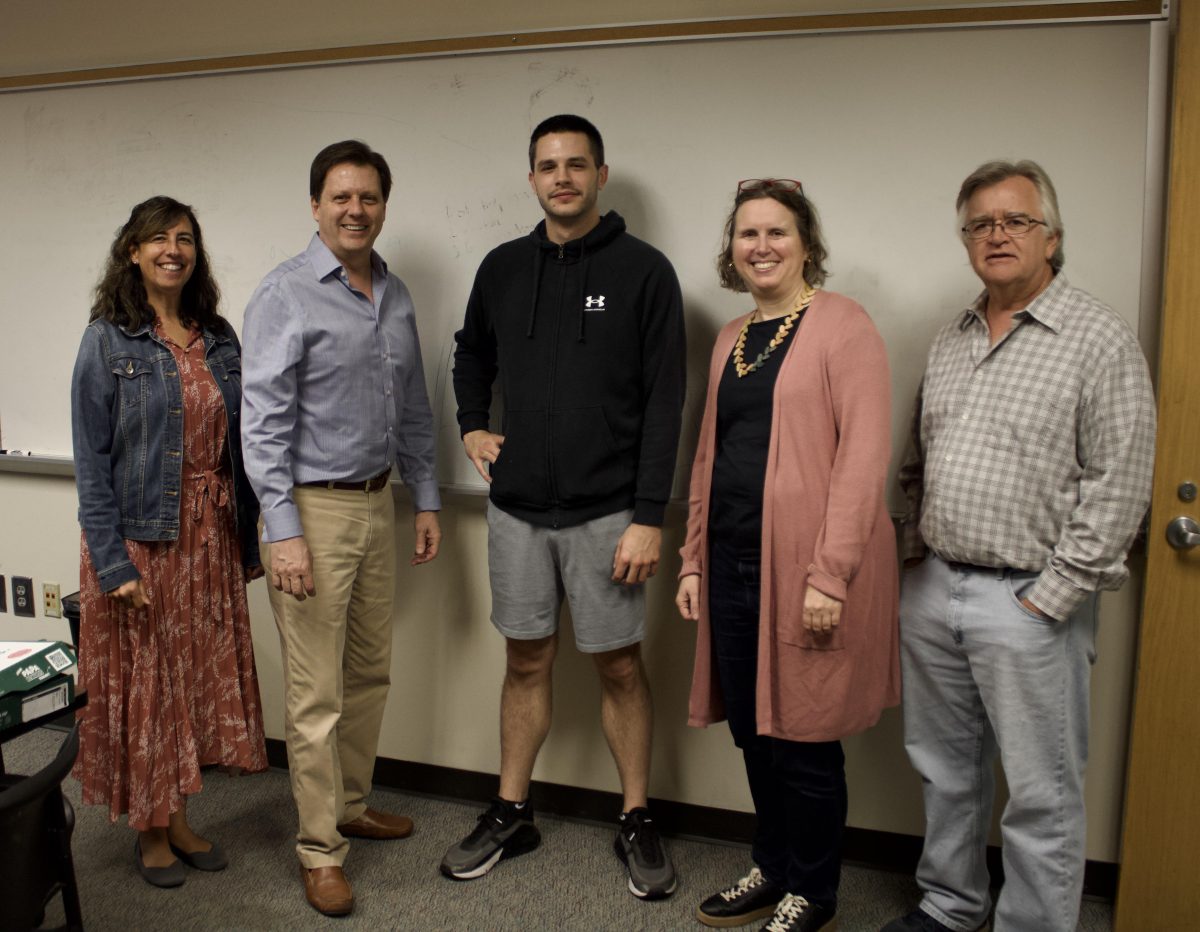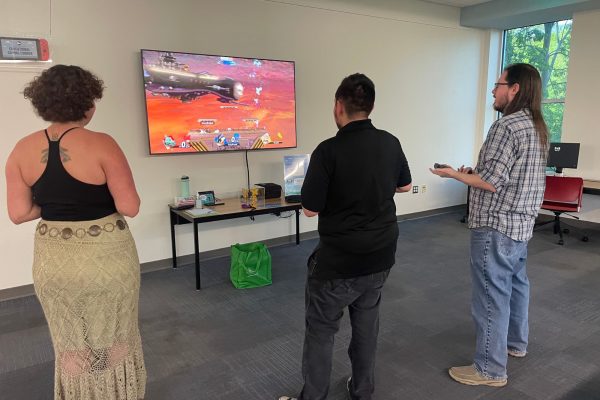Sexual Assault in our community: Why education matters
September 8, 2015
“I need a pick-up line from the audience, anybody got one for me?” Phillip asked the crowd.
“What dat mouf’ do?” hollered one new Georgia Southern University student sitting to the right of the stage, to the viral applause of the crowd.
“Ok, we can work with that,” Phillip said, now joining the crowd in laughter.
Phillip, along with his partner performer Anne, began to reenact a scene from a would-be college party: Phillip, playing the clichéd alphamale, and Anne playing the equally clichéd naive freshman girl.
Eventually, after a long and cringe-filled wooing, Phillip, now effectively sitting on top of Anne, blurts out his secondhand pick-up line.
“What dat mouf’ do?”
Three-hundred and fifty strong, the crowd, along with the performers, erupted in laughter.
_____________________
Phillip Sheridan and Anne Dufault are actors and activists brought in by GSU for the annual Sex Signals shows. The shows, which are required viewing for freshmen, employ a light-hearted and comedic approach to discuss alcohol, gender, bystander intervention and sexual assault in the college environment.
Demanding the attention of the audience in sometimes awkward subject matter and always entertaining presentation style, the two performers poke holes in stereotypes and question social norms.
“If a guy has sex with ten girls in a week he’s the man,” Phillip said after the opening act of the show.
“But if a girl has sex with ten guys she’s a slut, what’s that about?” Anne quickly rebutted.
But wedged between the serious discussion, caricature denying and sex jokes lies an uncomfortable truth for Phillip and Anne.
“For some of the folks in the room at our show it’s their first open discussion about sex, ever, period,” Sheridan said after the show was over, “That’s pretty concerning from our perspective, that’s why we do it.”
Sex Signals stands as the only mandatory programming, class or other form of required education that includes discussion and information on sexual assault in a student’s first semester at GSU; however, for most incoming freshmen, the hour-long show is a far cry from the schooling they’ve received before that point.
The state of Georgia maintains a hazy record on sexual education, particularly education and programming around sexual assault and rape. Since the early ‘80s, the state has followed the lead of the federal government in promoting abstinence-only education, which, according to research conducted and compiled by the Harvard Law School’s Human Rights Program, is generally found to fail at addressing sexual assault.
“Most abstinence-only texts fail to meaningfully discuss rape, sexual assault, or coercion, and even fewer give guidance to victims of sexual violence,” the report reads.
Starting in 1982, former President Ronald Reagan implemented federal funding to states that mandated abstinence-only education with the Adolescent Family Life Act, which laid the brickwork for multiple other federal funding efforts to take root to promote abstinence-until-marriage to K-12 students.
National abstinence-only guidelines address the subject of sexual assault in a provision made in 1996. One of the eight new statutes in the provision states:
“…teaches young people how to reject sexual advances and how alcohol and drug use increase vulnerability to sexual advances…”
What the statute does not do, however, is address how that is to be done and to what extent, leaving states in a bind.
Much of the federal funding offered to states teaching abstinence-based sex education curriculums was eliminated or has expired since former President George W. Bush made way for President Barack Obama, who supported a comprehensive health education overhaul when campaigning in 2007 and 2008.
Georgia, which fluctuates between first and third in teen dating violence as well as a middle-of-the-pack reported sexual assault rate according to the Center for Disease Control, has one mention of preventative sexual assault education or programming in its state’s Department of Education code.
According to O. G. C. A§ 20-2-314, which was updated in 2006 to add rape prevention to teen dating violence, the State Board of Education is required to establish “a rape prevention and personal safety education program and a program for preventing teen dating violence for grade eight through grade 12…”
_____________________
“I’ve sat through Sex Signals and seen these students’ faces when they go ‘That’s not cool?’ How have they not had the chance to learn [consent] in 18 years, learn that consent is enthusiastic and throughout and it isn’t unclear?” said Suzanne Shurling.
Shurling, who is a graduate assistant for SART, certified SRSAC victim’s advocate and operator for SRSAC’s crisis hotline, says the lack of education opportunity and understanding of the dangers of the college environment are often lost on new freshmen.
“Sometimes people think all of [SART’s] programming and events and discussion make Statesboro seem dangerous. People say ‘that doesn’t happen in Statesboro, we don’t need that.’ But we know that to be false, and it folks don’t hear it in school they need to hear it somewhere,” Shurling said.
Other than Sex Signals, GSU requires all students to take the Healthful Living course (HLTH 1520) as a precursor to graduating. However, students are not required to take the class in any specific time period, so long as the requirement is filled prior to graduation.
“The curriculum does its best to be comprehensive,” said Dr. Bridget Melton, associate professor of exercise science and Healthful Living instructor at GSU.
According to Melton, the first topic covered in the class is sexual violence and sexual assault.
“We cover sexual violence the first week of school, we talk about safety; that’s the first things they need and just being safe on campus. We know that is very high risk for women to be sexually assaulted early in the semester,” Melton said.
This phenomena has earned the unofficial title of the “Red Zone.”
The term, coined by Robin Warshaw in 1988, is the abbreviated way of describing the most statistically dangerous time of a college student’s career in regards to sexual assault and violence.
Researchers pinpoint various specific timeframes in a student’s first semester. Whether defined as the first three weeks, the first six weeks, the first two months or the whole first semester, all signs in research point to the early stages of a college career being the most susceptible to sexual assault.
The logic goes that as a student graduates high school and moves on to college, they are placed in a new and catalytic university environment that they are not acclimated to. Whether it be easier access to alcohol, new location, more parties, less time spent in class or lack of authority figures, the newly enrolled college freshmen is at a higher risk than the average college student.
The 2007 Campus Sexual Assault Study prepared for the National Institute of Justice found that more than half of sexual assaults occur in the first three and a half months of class in the fall term. Similarly, a 2008 study published by a group of researchers at Middlebury College found that far more reports of unwanted sexual experiences took place in the early parts of the fall semester.
According to University Police Department reports, seven out of the 15 sexual assaults, rapes or sexual violence incidents reported in the last three years occurred within the first three months of fall semesters. However, it is not possible to tell from the reports what academic year the students who reported were at the time of their report.
_____________________
“I didn’t rape her, it’s as simple as that,” Phillip said in Sex Signals’ final act, which depicted Phillip’s character on a question & answer game show with Anne playing the host.
The crowd booed, having had the details of the incident spelled out, even through an unreliable narrator like Phillip’s intentionally despicable character, made the situation clear to them.
“So you got her drunk, took her to your room and then had sex with her after she said no?” a student asked down the right wing of the stage“Yeah, but she didn’t fight back or anything. She just sat there, it wasn’t like that, it wasn’t rape,” Phillip responded.
More boos.
This story, its subsequent stories and last Tuesday’s story on the subject of sexual assault, sexual violence and rape on campus are part of an ongoing series to be published in The George-Anne over the course of the next few Tuesdays.








